The evolution of human-computer interaction has never truly been abandoned by Out of the Door.
Author: The Stylish Geek
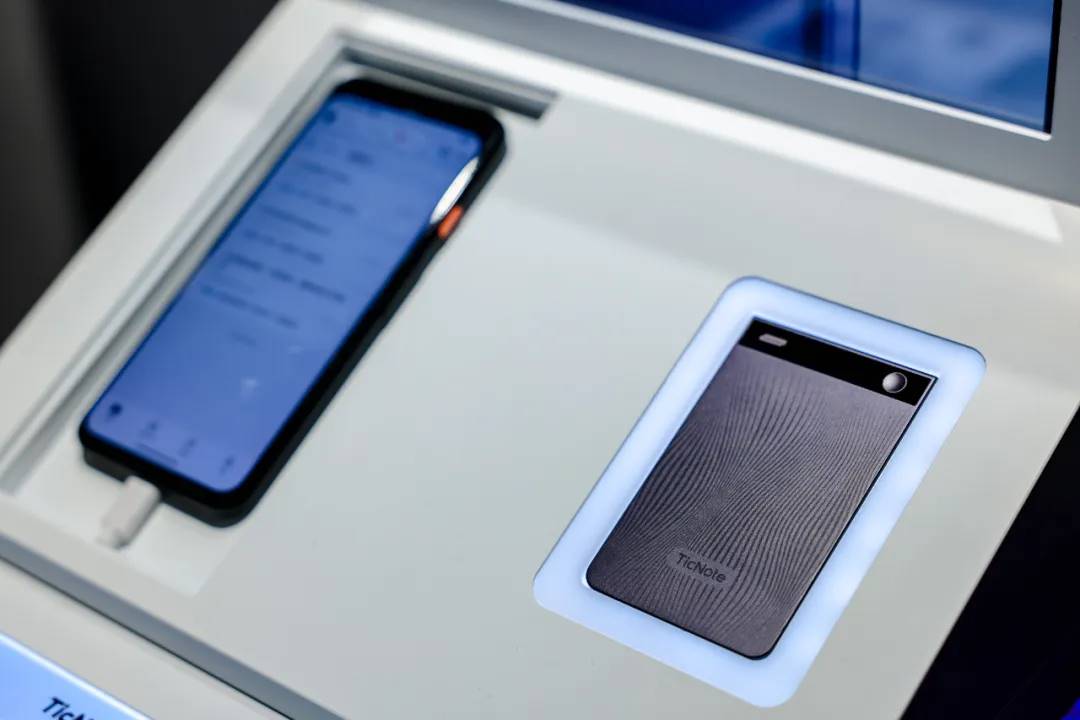
This year, the foundational capabilities of large models have once again achieved a leap forward, with AI tools like ChatGPT, DeepSeek, and Doubao becoming increasingly common assistants in the workplace for many professionals.
These AIs are indeed powerful, but they also come with a significant barrier: to get them to "work," it often requires a substantial amount of preparatory material. In other words, today's AI is more like a highly intelligent consultant, while from the perspective of practical efficiency, what we actually need is an "intelligent assistant" that is always by our side, helping me record information and providing reminders and feedback at critical moments.
Out of the Door is attempting to fill this gap. In April, the company publicly unveiled its global first Agentic AI hardware product, TicNote, and on June 25, this hardware was officially launched in China. At the launch event, Out of the Door's founder, Li Zhifei, emphasized that this is not just a voice recorder, translator, or voice assistant, but a "portable AI thinking partner."
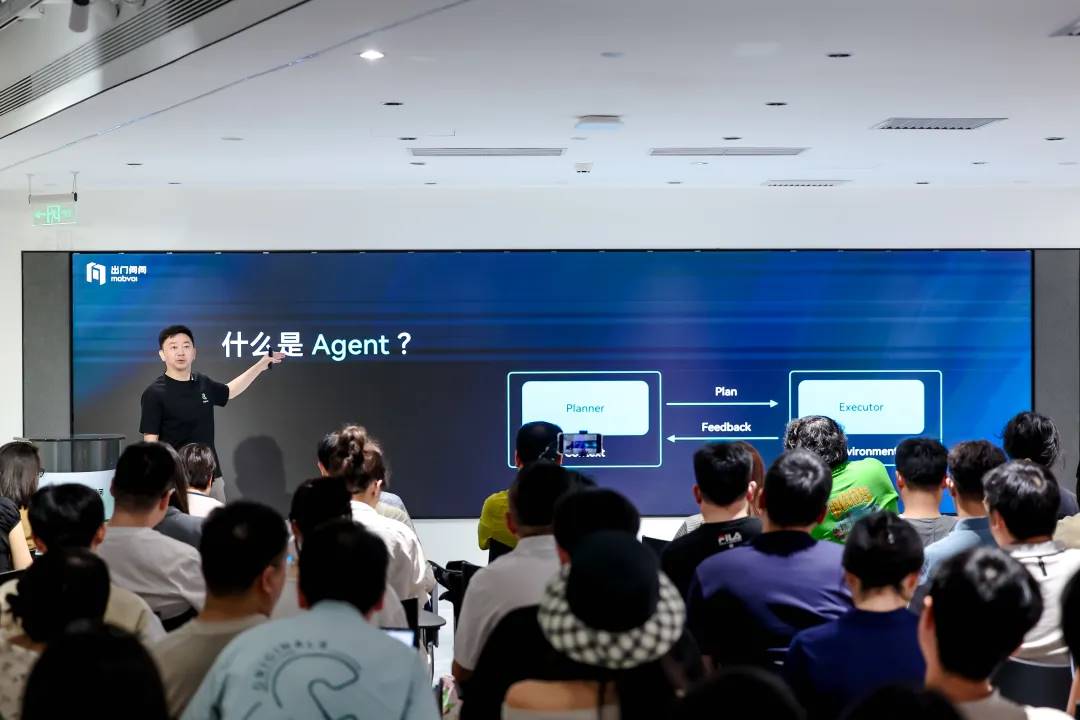
Before Out of the Door, some companies both domestically and internationally had attempted to combine large models with recording hardware, but they mostly still treated AI as an audio information processing tool, primarily using it to organize meeting notes or for translation. Although TicNote has similar capabilities, its positioning goes beyond that. By continuously recording users' work and life information, TicNote effectively becomes a "super assistant" that accompanies users 24/7, actively providing work inspiration and insights based on daily communication content and the reasoning capabilities of large models.
As an "old friend" of Geek Park, we have witnessed Out of the Door's complete journey from startup to IPO, as well as its strategic contractions in the direction of large models. Now, Out of the Door has chosen to re-enter the large model race through hardware, which is not simply a matter of chasing trends or imitating others, but rather a culmination of founder Li Zhifei's years of accumulation in the field of human-computer voice interaction—having seen existing paths validated, he also perceives deeper possibilities and hopes to create better products in this direction.
01
A Portable "AI Assistant"
TicNote resembles a compact magnetic charging bank, with a thickness of about 3 millimeters, allowing it to be magnetically attached to the back of a phone throughout the day, hardly affecting daily use.
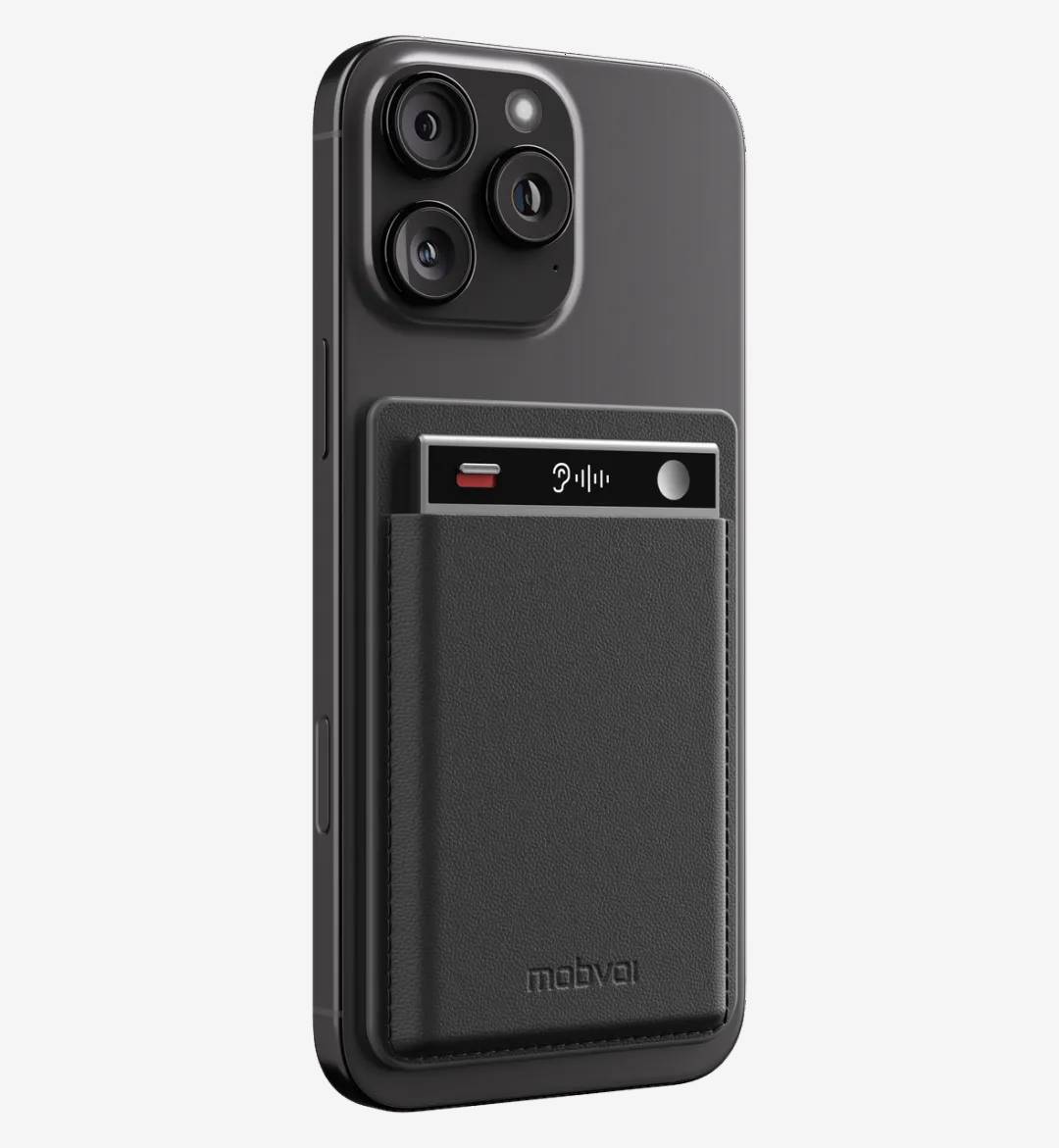
Unlike traditional voice recorders, TicNote's card-style design is aimed at "all-weather recording" scenarios from the very beginning. Users can easily control the recording operation mode.
This hardware form is not a first for Out of the Door; earlier products like Plaud Note also adopted a similar design. Its advantage lies in its ability to operate stably for extended periods in scenarios that require extensive voice recording, such as education, media, and creative planning, while leveraging large model capabilities to enhance efficiency in transcription, translation, and summarization.
This application scenario has already gained a certain degree of market validation, but Out of the Door believes that the combination of card-style recording hardware and large models holds even greater potential beyond recording and processing functions.
In addition to basic functions like transcription and summarization, TicNote's biggest feature is its built-in AI Agent "Shadow AI." It supports real-time conversation, logical reasoning, knowledge integration, and writing suggestions, allowing for a deeper understanding of users' content creation needs. Whether in work, study, or inspiration exploration, it can maintain a dialogue with users, assist in task completion, and become a close intelligent assistant.
Yolanda is one of the beta users of TicNote. As a tech executive and mother of a child preparing for the high school entrance exam, she often faces challenges of fragmented time and information overload, making it difficult to balance family and work. TicNote has significantly alleviated this dilemma for her.
During a conflict between an online parent meeting and an important company review meeting, Yolanda was unable to attend both simultaneously. Therefore, she used TicNote to "invisibly" record the entire content of the parent meeting, which was then accurately transcribed and automatically distilled into clear written summaries and mind maps, allowing her to grasp the meeting information comprehensively without needing to replay it.
Additionally, Yolanda has her child carry TicNote during each tutoring session. Over a semester, TicNote not only recorded the teacher's key points but also helped summarize the child's knowledge weaknesses. As the high school entrance exam approached, her child used TicNote to organize the "on-site toolkit" and "emergency methods" taught by the teacher, forming clear review materials based on the weak points.
From Yolanda's experience, it is evident that TicNote is not just a portable recording tool, but through the integrated design of hardware and software along with large model capabilities, it is gradually evolving into a truly "understanding you" intelligent assistant. Behind such a product is Out of the Door's decade-long dedication to voice technology and human-computer interaction.
02
A Company Committed to Human-Computer Interaction for Ten Years
Out of the Door's launch of TicNote is not a coincidence. The "hardware-software integration + AI service" path represented by this product is actually a natural result of Out of the Door's ten years of technological accumulation and product exploration.
Since its establishment in 2012, Out of the Door has focused on human-computer voice interaction as its core direction, being one of the earliest companies in China to practice the "voice-first" concept. The early self-developed voice assistant app focused on Chinese voice recognition and natural language understanding. In the following years, the company continuously attempted to embed voice capabilities into hardware, launching products such as the smart watch TicWatch, smart rearview mirror TicMirror, and translator TicTranslator, persistently exploring the application possibilities of voice and devices.
These products were at the forefront of the industry at the time and accumulated considerable technical experience, but challenges such as the usage threshold and cost of voice interaction have always restricted it from becoming a mainstream operating method. Users needed to communicate with devices through wake words and command language, which resulted in high interaction costs and low fault tolerance, making it difficult to handle complex tasks. Consequently, Out of the Door temporarily reduced its hardware product line and shifted its focus to refining AI capabilities.
However, this evolution of human-computer interaction has never truly been abandoned by Out of the Door. The arrival of the large model era has brought new opportunities for human-computer voice interaction. With the improvement of model understanding and generation capabilities, human-computer dialogue has become more natural, and more users are beginning to communicate with AI in a conversational manner. Voice, as the interaction method closest to human expression habits, has thus regained its value and is expected to become an important entry point connecting AI with the real world.
TicNote was launched against this backdrop. It is not only an intelligent device for recording but also, through the built-in AI Agent "Shadow AI," continuously organizes the content users hear and say into structured information, building a "personal knowledge base" for each individual. Based on this personalized knowledge base, large models can not only be efficiently accessed but can also connect to the internet to explore the value of information at higher dimensions.
This product form is an integration of Out of the Door's multi-dimensional technological accumulation in voice recognition, natural language understanding, and terminal design. For example, with TicNote's "Flash Chat" feature, users can initiate voice conversations at any time during recording, quickly review previous content, and extract key information, making it suitable for interviews, meetings, and other scenarios that require immediate feedback. This "record while asking" interaction mode is a result of Out of the Door's decade-long commitment to voice technology.
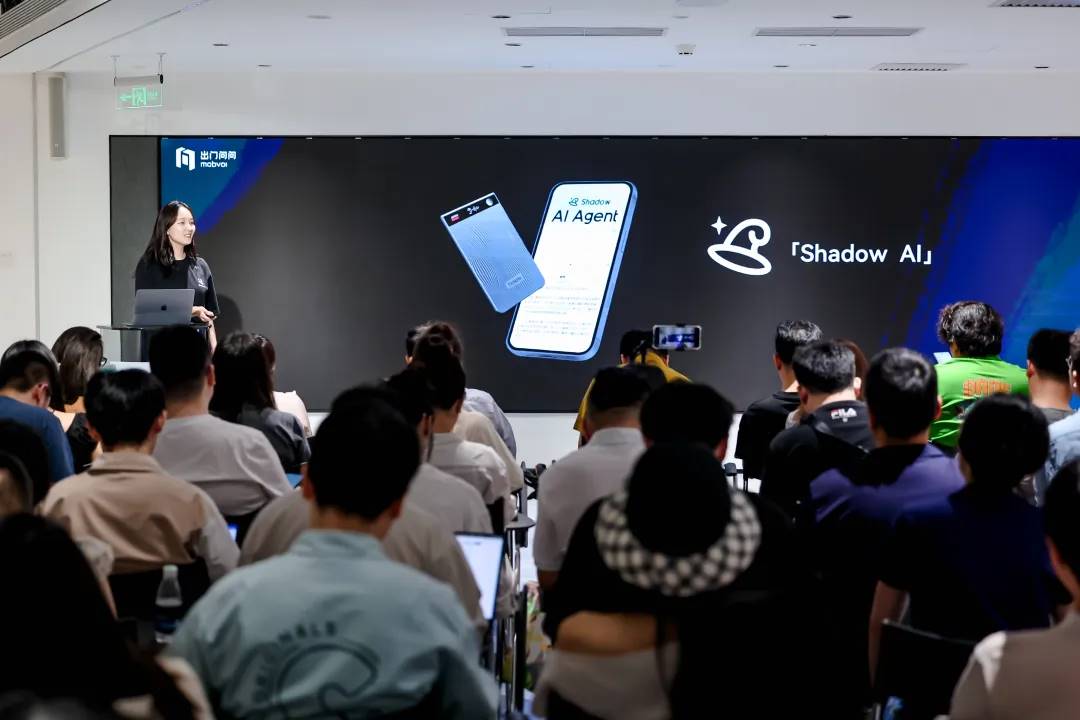
At the same time, TicNote also possesses automated project management capabilities. In the past, even AI voice recorders were often limited to single scenarios, processing a segment of content only after recording. However, in TicNote's interaction logic, all recorded data is unified into a sustainable and expandable knowledge base, allowing users to call, organize, and continue conversations across different scenarios and times. This more intuitive way of organizing information makes TicNote not only serve professional users but also possess broad applicability for daily use.
More importantly, this time, Out of the Door is no longer trying to use voice to "control a machine," but rather leveraging large model capabilities to make voice an entry point for building knowledge and a facilitator for promoting thought.
Looking back, TicNote is not a mere turn in technological direction, but more like a completion—it gathers every step Out of the Door has taken over the past decade, concentrating experiences scattered across human-computer interaction, hardware design, and AI services into a product more suited for this era.
03
In the Future, Everyone Will Need a "High-Dimensional Memory Warehouse"
Currently, ADHD has become a hot social topic. "Difficulty concentrating" as a symptom is becoming increasingly common. Beyond those with actual ADHD, more and more ordinary people are beginning to notice similar symptoms and even starting to "self-diagnose."
This is closely related to the massive information overload we are experiencing. Looking back, humanity has never had to receive and process as much information daily as we do today; this information flows into our eyes not only through our phones but also exists in every scene of life. We receive too much information every day, yet the shelf life of our thoughts is getting shorter.
A common understanding in the past was that compared to physical labor, mental labor is easy, and sitting in an office is a "privilege" for a few, a common pursuit for people. However, now, more and more people are engaged in information-related work, yet they feel fatigued or even weary of it.
We are increasingly aware that processing information is also a form of load that can lead to "strain." In the present, we need to reduce the burden on our brains just as we use mechanical tools to replace physical labor. Such devices must possess perception, interaction, and the ability to assist in thinking and insights, becoming our "pre-sensory" and "auxiliary brain."
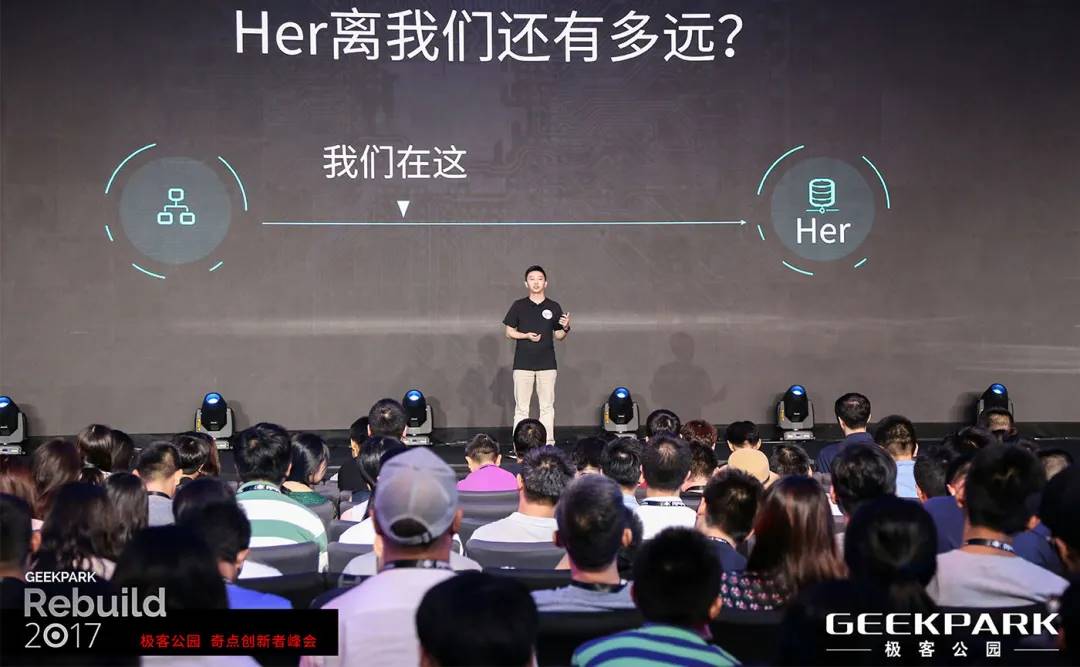
This may be the ultimate ambition of TicNote and Out of the Door in the future.
Today, the vast majority of AI products provide users with information from a "single scenario perspective." In reality, the ultimate future of AI should be to assist users in managing their entire memory and thinking, which includes not only information and knowledge but also memories. The concept of "life flow" has already been proposed in the AI industry; the recorded life flow is essentially our "memory warehouse." What Agentic AI can do is elevate this memory warehouse, uncovering thoughts and insights that we may not even be aware of, ultimately helping us reduce the burden of receiving information and sparking more inspiration.
In the foreseeable future, each of us will need an agent with perfect memory that can assist us in thinking, helping us reorganize the information we receive and increasing the dimensions of our thinking. The built-in "Aha Moment" feature of TicNote has already provided a glimpse into this future. It can offer AI perspectives of "insights" based on the data saved by the user.
Currently, the vast majority of AI assistant products are trained on publicly available corpora in a broad sense, largely aiming for "omniscience and omnipotence" as their training and development goals. However, what more users actually need is a form of "personalized AI." This Agentic AI should understand our private knowledge more and provide information that is directly relevant to us, helping us build personalized experiences.
For Out of the Door and Li Zhifei, TicNote represents not only a successful realization of their technological ideals over the past twelve years but also a new departure towards the future of AIGC. They have awaited the new era of human-computer interaction and the new era of AIGC. TicNote is by no means a "speculation" in product terms, but rather a culmination of a long-term technological "romance."
In April of last year, Out of the Door went public, becoming the first AIGC stock in China. For Li Zhifei and his team, solving the issue of "money" has never been the most important thing; what matters more is that they can refine the technology they firmly believe in to its best state and then bring it to the world.
Now, they have taken another solid step forward.
免责声明:本文章仅代表作者个人观点,不代表本平台的立场和观点。本文章仅供信息分享,不构成对任何人的任何投资建议。用户与作者之间的任何争议,与本平台无关。如网页中刊载的文章或图片涉及侵权,请提供相关的权利证明和身份证明发送邮件到support@aicoin.com,本平台相关工作人员将会进行核查。




